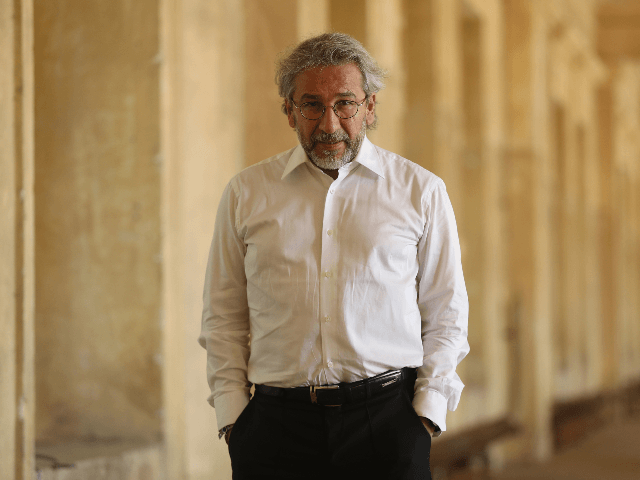Turkish journalist Can Dundar, onetime editor of the Cumhuriyet newspaper, on Sunday accused the Turkish government of “hosting ISIS for years” and “releasing their guerrillas” from captivity.
He urged Turks truly concerned about terrorism to “come together” with the Kurds and fight the Islamic State in a way the government of President Recep Tayyip Erdogan never will.
Dundar was arrested by the Erdogan government in 2015 for a Cumhuriyet expose that claimed Turkish intelligence was covertly supplying weapons to ISIS in Syria. He and his colleague Erdem Gul were charged with espionage and accused of being terrorists themselves, spending three months in prison before they were released on the orders of a Turkish constitutional court.
Dundar wisely departed for Germany after his release and lives there in exile. Turkish courts eventually changed their minds and retroactively sentenced him to 15 to 20 years in prison for espionage, while Gul was acquitted of his own charges. Turkey issued an arrest warrant for him in absentia and Erdogan demanded his extradition from Germany as a “spy.”
Dundar spoke with Kurdistan 24 news while visiting Washington, DC, to collect a Carnegie Endowment democracy award. He expressed grave doubts that Erdogan’s government could be trusted to respect the Kurdish population of Syria or fight effectively against the Islamic State, pointing to his work at Cumhuriyet to illustrate that Turkey has used ISIS as an instrument of policy in Syria, and is currently allied with Syrian militia groups that are not easy to distinguish from ISIS militants themselves:
“The only way to stop this bloodshed,” Dundar said, is cooperation between Turks and Kurds against the terrorist group.
“This is the only way to assure peace in Turkey and in the region,” he continued, as he added, “It’s difficult for us to understand why we [Turks and Kurds] are fighting with each other.”
US President Donald Trump is counting on Turkey to prevent the re-emergence of the Islamic State, but asked if he thought Turkey would do so, Dundar thought not.
“Turkey has been hosting ISIS for years,” he replied. “Everyone knows it in the region.”
Turkey was “hosting them in different cities, ISIS headquarters,” and “they were releasing their guerrillas,” Dundar continued. “So I don’t think the Turkish government is the best choice to get rid of ISIS.”
Dundar said Erdogan invaded Syria primarily to goose his nationalist support at home because he faces stiff political challenges, both from within his AKP party and from competing parties of a more democratic bent, including the Kurd-friendly People’s Democratic Party (HDP).
“The official narrative is that they are fighting against terrorism, PKK terrorism – but, I guess, Erdogan needed this war,” he said. “He needed something to unify his supporters and enhance his own power, so declaring war is the best solution for him, unfortunately, but not for Turkey, not for us.”
Kurdistan 24 bolstered Dundar’s argument by interviewing some female ISIS suspects living in al-Hol, one of the camps in northeastern Syria menaced by the Turkish invasion. The ISIS brides applauded the incursion and said they expected to be freed by the Turks.
“God willing, Turkey will help us to flee from here and go to Turkey,” said one of the ISIS women, identified by Kurdistan 24 as a French national.
“We heard that the Turkish army attacked Ain Issa, and our sisters who were detained there have escaped and they fled to Turkey,” she added, referring to another camp.
“We want Turkey to attack here. If the Turkish army comes to this area, I will be able to flee and meet my husband, who I know well is in Turkey,” said another ISIS bride, this one from Russia.
Al-Hol camp administrators told Kurdistan 24 that 600 of the 900 Kurdish YPG fighters who guarded the camp have been called away to fight the Turks and humanitarian organizations have also departed. The camp population is reportedly growing more unruly and has become fond of chanting “the slogans of the Islamic State and the caliphate” at the remaining guards.
Another group alarmed by the Turkish invasion is the Yazidis, a small, frequently-persecuted, ethnically Kurdish religious minority.
“The current events in northeastern Syria, if not halted, will annihilate Yazidis from their ancestral homeland in Syria, which will affect the historical presence of Yazidi in the Middle East, particularly their ancestral homeland in Iraq and Syria,” said an open letter published by Yazidi activists and community leaders on Sunday.
“We call on the international community to take all necessary measures to halt all military operations in northeastern Syria. We also call for a political process in Syria that will ensure sustainable peace for all people of Syria, and that ethnic and religious components of Syria to be considered as an important factor in determining the future of Syria, including of the Yazidis,” the letter said.

COMMENTS
Please let us know if you're having issues with commenting.